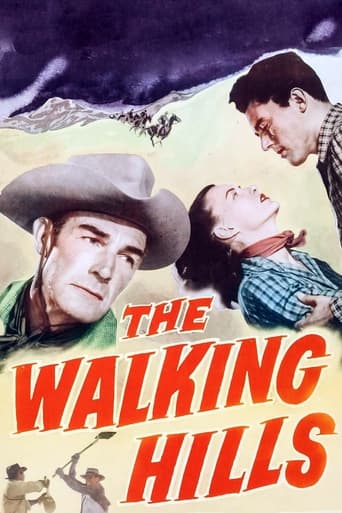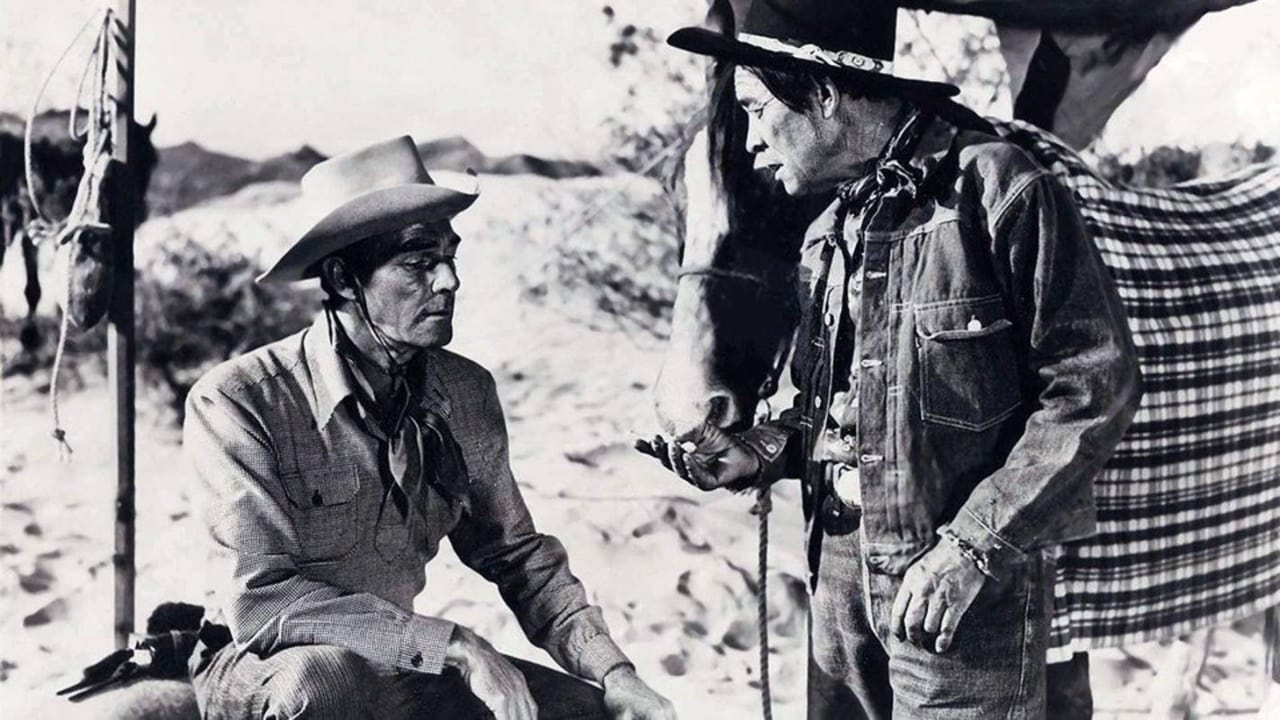MartinHafer
I was not particularly impressed with "The Walking Hills". Apart from the fact that hills do not walk, the film was rather dull and the same sort of material was handled MUCH better in "The Treasure of the Sierra Madre".The film is about a motley group of folks in the modern west who go searching for lost gold. For some inexplicable reason, they brought along a guy who LOVES to sing folk music. By the time he began singing "I Gave My Love a Cherry", I was about to kill myself because I hated the music so much. Plus, he was a MAJOR distraction and this only would have worked if everyone else beat the guy to death to shut him up. Instead, there's some plot about folks hiding from the law and perhaps a lawman among them. But the film was drawn out so long and was so uneventful, I simply didn't care.All in all, a rather grim and boring film. One of the few Randolph Scott pictures I've seen that really didn't entertain in the least due to a dull script.By the way, at one point, a guy claims to have found a finger from a skeleton. The bones were completely articulated even though they'd been there for years and all the flesh had been eaten away for most of this time. For your information, after the flesh disintegrates from a body, the individual bones soon fall apart and do NOT stay magically connected to each other in much of the body.
Reedmalloy
The reviews that have thus far been written here about "The Walking Hills" (except for a few clunkers) do it justice. It is a compact piece of good film-making and quality entertainment. The quality of the acting makes the subsequent plot twists believable without hitting you over the head in their revelations.Not much is said about Alan Le May's script, however. He is little remembered today except possibly as the writer whose novel ''The Searchers" was turned into John Ford's great western. I grew up reading everything he wrote and found Le May a skilled story-teller who always remembered that the story was the whole point of it all.Le May crafted subtly complex stories about frontier Texas (despite being from Indiana) before Larry McMurtry was even born. His westerns are an easy-reading blend of his own knowledge of human nature, Louis L'Amour's (whom he preceded) formula romance, and a Hemingway style prose. His characters were given names and personalities that ring absolutely true, and he treats readers as adults capable of putting two-and-two together themselves. The only writer I ever found to rival him in creating an elusive combination of complexity and subtlety in a sagebrush saga is Frank X. Tolbert, much of whose work reads like Le May's.Such is the case with "The Walking Hills". Le May fleshes out his plot with details, but just enough to elucidate motivations while keeping the story moving. He never goes too far or too often, and as others noted, some of the character "back-stories" (such as Johnny's and Cleve's) tell just enough to give them a purpose while others (those of Chalk, Old Willy, and Josh) are left to the imagination of the viewer. Le May didn't throw a detail into the plot that wasn't wrapped up by the end, and in the natural course of events. Pretty good stuff.As a side-note to reviewer "bkoganbing", Ella Raines' husband was ROBIN Olds, a legendary character himself, and he never flew jets in Korea, much less became an ace there. In fact Ella went behind his back and used her friendship with people of influence to keep him out of that war, which may have played a part in their eventual separation when he went on to become an icon in the Vietnam War.
alexandre michel liberman (tmwest)
"The Walking Hills" is a film you feel is a masterpiece when it starts, but along the way it loses itself in the sandstorm. It was made right after "The Treasure of the Sierra Madre" and it follows the same type of plot about men's greed and a treasure. It all starts in a poker game when a young cowboy, Johnny, mentions seeing a wagon wheel in the desert, that being the clue for a missing treasure lost in a wagon about 100 years ago. In Brazil this film was titled "Sete Homens Maus" (Seven Bad Men), even though they are eight plus a woman, Chris (Ella Raines). Anyhow it made me think , specially in some scenes where they are all shown together, of "The Magnificent Seven" directed later on (1960) by the same John Sturges. Sturges was a specialist in action scenes and looked down on "spaghetti" westerns which were characterized by non explicit action scenes, and so it is surprising to see Sturges use a sandstorm, where you half see the action, as the main event of the film. I am sure that if Sturges would have made this film later when he was more known, it would be a better job.
clore_2
A very rewarding "lust for gold" adventure that tells its story in a brief 78 minutes and is all the better for it. Director John Sturges would later in his career allow some of his films to run overlong (THE GREAT ESCAPE) or blow up what should have been more simply told (GUNFIGHT AT THE OK CORRAL - the depicted gunfight itself is but one example), but earlier in his career made a number of lean, taut treasures, this is one of them.A group of people are bound together in the search for some wagons believed to have been lost in the desert a century earlier, and the legend has it that gold was on them. When the youngest of them happens to mention something spotted in the desert, the need for secrecy binds the group together lest someone reveal the "golden opportunity." Several in the group have pasts that they are trying to hide and potential futures they are trying to escape if caught. One of them is a detective hot on a fugitive's trail, but willing to set aside duty for his share of the loot. Randolph Scott headlines as the more or less moral center of the group, even if his intentions and actions seem to defy that description. For a slightly less than "A" feature, the film boasts an admirable cast of characters, among them Ella Raines, John Ireland, Arthur Kennedy, Edgar Buchanan (scene stealing as usual) and blues/folk revivalist singer Josh White whose musical contributions to the film capture a legendary performer for posterity on film. William Bishop, a young man whom Columbia was grooming for stardom (but who failed to click and would soon "descend" to mostly TV work) is the least familiar perhaps of the major actors, but he's impressive enough here for one to wish he had done better within the ten years that he had left before cancer took him at 41.An interesting subplot has Scott's mare about to foal - a metaphor for new life or spiritual rebirth being created among the desert ruins. It gives nothing away to reveal that the fugitive surrenders or that some characters realize that gold fever can cause one to suspend principles - the latter is expected in such melodramas. But with its stunning black-and-white cinematography, especially in night scenes and the climatic desert storm, this film is as much of a treasure as that which its protagonists seek. Camera ace Charles Lawton must have impressed Scott and producer Harry Joe Brown as he would do five more films with the pair in the next decade. Highly recommended.


 AD
AD


